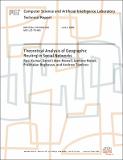| dc.contributor.author | Kumar, Ravi | |
| dc.contributor.author | Liben-Nowell, David | |
| dc.contributor.author | Novak, Jasmine | |
| dc.contributor.author | Raghavan, Prabhakar | |
| dc.contributor.author | Tomkins, Andrew | |
| dc.contributor.other | Theory of Computation | |
| dc.date.accessioned | 2005-12-22T02:32:28Z | |
| dc.date.available | 2005-12-22T02:32:28Z | |
| dc.date.issued | 2005-06-03 | |
| dc.identifier.other | MIT-CSAIL-TR-2005-040 | |
| dc.identifier.other | MIT-LCS-TR-990 | |
| dc.identifier.uri | http://hdl.handle.net/1721.1/30551 | |
| dc.description.abstract | We introduce a formal model for geographic social networks, and introduce the notion of rank-based friendship, in which the probability that a person v is a friend of a person u is inversely proportional to the number of people w who live closer to u than v does. We then prove our main theorem, showing that rank-based friendship is a sufficient explanation of the navigability of any geographic social network that adheres to it. | |
| dc.format.extent | 8 p. | |
| dc.format.extent | 8282908 bytes | |
| dc.format.extent | 444233 bytes | |
| dc.format.mimetype | application/postscript | |
| dc.format.mimetype | application/pdf | |
| dc.language.iso | en_US | |
| dc.relation.ispartofseries | Massachusetts Institute of Technology Computer Science and Artificial Intelligence Laboratory | |
| dc.title | Theoretical Analysis of Geographic Routing in Social Networks | |
